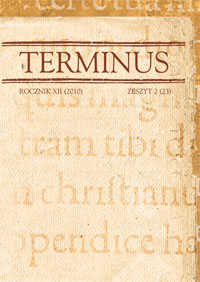„O łotrze przeklęty, o zdrajca niewierny, o wilku chwatający” – zwroty do postaci
„YOU SCOUNDREL, YOU UNFAITHFUL TRAITOR, YOU BITING WOLF...” – WAYS OF ADDRESSING THE CHARACTERS IN THE ‘PRZEMYŚL MEDITATIONS’ AS A DIFFERENT DIMENSION
Author(s): Dorota Rojszczak-Robińska Subject(s): Language and Literature Studies
Published by: Wydawnictwo Uniwersytetu Jagiellońskiego
Keywords: ROZMYSLANIE PRZEMYSKIE; POLISH APOCRYPHA; THE APOSTROPHES
Summary/Abstract: This article treats about apostrophes in Rozmyslanie przemyskie. In the past few years in mediaeval studies began to appear the questions about what in this biggest old Polish Apocrypha is original, written by it’s author, and what is taken from the Latin sources. Also began to appear the questions about the role of this text (treaty, story, mediatation) and who was it’s author. It was pointed out, inter alia, that some parts of the text is fi nished part of the sermon. The author took a different, than previously indicated, area of the text. She selected for analyses the apostrophes. She analyzed only those apostrophes, which are addressed directly to the characters by the narrator – the independent ones, and not those, which are inserted into the mouth of the other performing character. Due to lack of Latin sources, we can assume that they were written by the Polish author. Out of the characters, to which the narrator speaks in these complex apostrophes, Judas is distinguished by the number of apostrophes and their content. Invocations to the traitor add not much to the plot, the reader of the apocrypha can learn few about the Judas from them. They rather build the reader’s attitude to this villain, cause they are very emotional. In addition, they refer to these defects of Judas, which can also concerne people of all ages – especially avarice and greed. Their language and content suggest that are the next – next to two sermons – ready, prepared rhetorically, passages of the text that can serve the work of preaching.
Journal: TERMINUS
- Issue Year: 12/2010
- Issue No: 23
- Page Range: 63-77
- Page Count: 15
- Language: Polish

